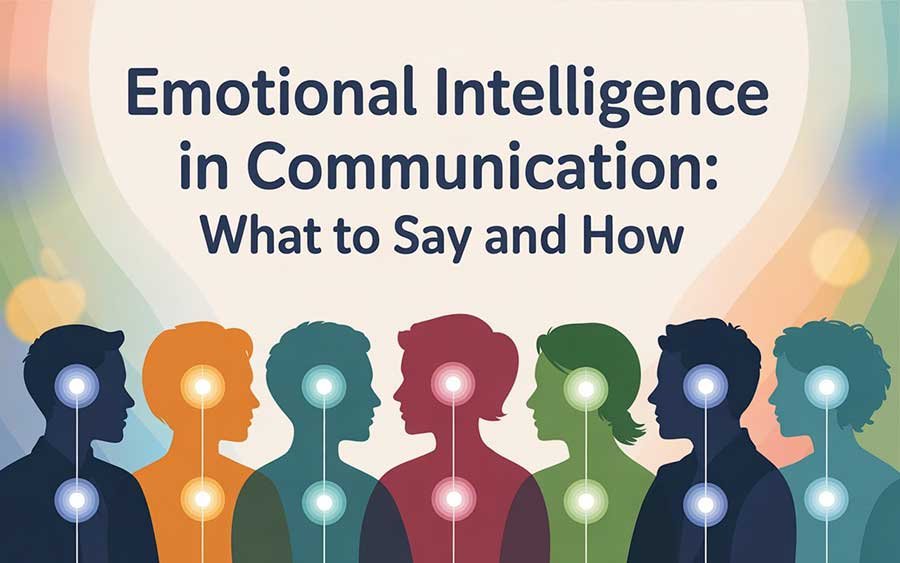
Emotional Intelligence in Communication: What to Say and How to Say It
Communication is the cornerstone of all human interaction – in our personal lives, professional careers, and within our communities. Yet, how often do our words fall flat, lead to misunderstandings, or even escalate conflict? It’s easy to focus on what we say, but the true magic of effective communication lies in how we say it, and that’s where emotional intelligence (EQ) becomes indispensable.

Emotional intelligence is the ability to understand, use, and manage your own emotions in positive ways to relieve stress, communicate effectively, empathize with others, and defuse conflict. When applied to communication, it transforms conversations from mere exchanges of information into opportunities for genuine connection, understanding, and collaboration. It allows us to navigate complex interpersonal dynamics with grace, even when emotions run high. Without EQ, even the most well-intentioned words can be misinterpreted, and crucial messages can be lost in translation.
This article will break down the role of emotional intelligence in communication, offering practical insights into whatto say in challenging situations and, critically, how to say it to foster stronger relationships, resolve conflicts, and ensure your message truly lands. This skill set is foundational for improving communication in all aspects of life.
The EQ Advantage in Every Conversation
Think of emotional intelligence as your internal communication GPS. It helps you:
- Understand Yourself: Recognize your own emotions and how they influence your communication style. Are you prone to defensiveness? Do you shut down under stress? Knowing this helps you manage your own responses.
- Understand Others: Tune into the emotions of the person you’re speaking with. Are they frustrated, anxious, or excited? Reading these cues allows you to tailor your message and approach.
- Empathize: Put yourself in their shoes. Understand their perspective, even if you don’t agree with it. This builds rapport and trust.
- Manage Interactions: Skillfully navigate difficult conversations, de-escalate tension, and build bridges rather than walls.
Without EQ, communication can devolve into monologues, arguments, or missed signals. With it, every conversation becomes an opportunity for growth and understanding.
What to Say: Phrases for Emotionally Intelligent Communication
Beyond just listening, emotionally intelligent communication involves choosing words that acknowledge feelings, invite dialogue, and promote understanding.
1. Acknowledging and Validating Emotions
Often, people just want to feel heard. Validating their emotions doesn’t mean you agree with their perspective or behavior, only that you recognize their feelings.
- What to Say:
- “I can see why you’d feel [frustrated/upset/overwhelmed] by that.”
- “It sounds like you’re feeling a lot of [pressure/disappointment] right now.”
- “I understand this is a really [difficult/stressful] situation for you.”
- “That makes sense.” (A simple, powerful phrase that validates.)
- How to Say It: With a calm, empathetic tone. Maintain open body language. Avoid sarcasm or dismissiveness.
- Real-Life Example: A colleague is visibly stressed about a tight deadline. Instead of saying, “Just get it done,” an emotionally intelligent response would be: “I can see the pressure you’re under right now. This deadline is definitely a lot. How can I help?” This acknowledges their struggle and opens a door for support.
2. Using “I” Statements for Expressing Needs and Feelings
When you express your own feelings, focus on how you feel, rather than blaming the other person.
- What to Say:
- “I feel [emotion] when [specific action] because [impact on you].” (e.g., “I feel overlooked when my ideas are cut off in meetings because I don’t feel heard.”)
- “I need [specific action] so that [positive outcome for you].”
- “I’m feeling a bit overwhelmed, and I need a moment to collect my thoughts.”
- How to Say It: Calmly and assertively, not aggressively or passively. Focus on expressing your need, not demanding a change from the other person. This approach is key to how to improve communication within your family and fostering healthier interactions.
- Real-Life Example: Instead of “You always interrupt me!” try: “I feel unheard when I’m speaking and someone talks over me. I would appreciate it if I could finish my thought.”
3. Asking Clarifying Questions (Curiosity Over Assumption)
Emotional intelligence thrives on understanding, not assumption. When in doubt, ask.
- What to Say:
- “Can you tell me more about that?”
- “When you say [X], what do you mean specifically?”
- “Could you give me an example?”
- “Help me understand your perspective on this.”
- How to Say It: With genuine curiosity, not interrogation. Your tone should be open and inviting, encouraging the other person to elaborate without feeling judged or cornered.
- Real-Life Example: Your partner seems distant. Instead of assuming they’re angry, ask: “I’ve noticed you seem a bit quiet. Is everything okay? I’m here if you want to talk.” This invites an explanation rather than escalating tension.
4. Setting Boundaries with Empathy
Emotional intelligence allows you to protect your energy and time while still respecting others.
- What to Say:
- “I understand this is important to you, and I wish I could help, but I’m unable to take that on right now.”
- “My capacity is full at the moment, so I need to say no to that request.”
- “I’m not available for that discussion right now, but I can check in at [specific time].”
- How to Say It: Firmly but kindly. Avoid excessive apologies or excuses. Be clear and direct, but acknowledge their need where appropriate. This is also applicable in financial contexts, for instance, when couples learn how to tackle debt together as a couple, setting boundaries around spending is crucial.
- Real-Life Example: A colleague asks you to take on an extra project when you’re already swamped. Instead of a resentful “No, I’m too busy,” try: “I appreciate you thinking of me for this, and I understand it’s a priority. However, my current workload means I wouldn’t be able to give this project the attention it deserves right now.”
5. Offering Constructive Feedback with Care
Giving feedback effectively requires a high degree of EQ to ensure it’s received as helpful, not hurtful.
- What to Say:
- “I noticed [specific behavior/action], and the impact was [specific outcome]. My intention is to [desired positive outcome].”
- “I have some feedback regarding [topic]. Are you open to hearing it now?”
- “I’m sharing this because I believe in your potential to [improve/grow].”
- How to Say It: Privately, gently, and with a focus on observable behavior and its impact, not on personal attacks. Ensure your intention is truly helpful.
- Real-Life Example: Instead of “Your presentation was terrible,” try: “In your presentation, I noticed that the slides were very dense, which made it hard to follow your key points. For next time, consider using fewer words on each slide to keep the audience engaged. I think that could really elevate your message.”
6. Practicing Strategic Silence and Listening
Sometimes, the most emotionally intelligent thing you can do is say nothing at all.
- The Strategy: Allow for pauses in conversation. Listen not just for words, but for the underlying emotions, needs, and intentions. Don’t interrupt. Don’t immediately formulate your response.
- Real-Life Example: During a heated discussion with a family member, I used to jump in with my rebuttals. Practicing strategic silence forced me to truly listen. Often, the person just needed to vent and feel heard. By simply listening intently, my family member felt understood, and the intensity of the emotion dissipated, allowing for a much more productive conversation once they were done speaking. This is a powerful component of how practicing silence can boost your communication skills.
The Journey to Better Communication: Beyond Words
Developing emotional intelligence in communication is a continuous journey. It requires self-awareness, empathy, and a willingness to be vulnerable. It’s about recognizing that every interaction is an opportunity to connect on a deeper level.
By consciously choosing your words and, more importantly, your underlying attitude, you can transform your relationships, navigate challenges with greater ease, and ultimately build a life rich with meaningful connections. Just as how knowing my purpose changed how I see myself reshaped my identity, mastering these communication skills will fundamentally alter how you interact with the world around you and, by extension, how you experience life. Remember that effective communication also plays a role in personal productivity and well-being, complementing strategies like the 7 time management hacks that changed my life.
20 Empowering Quotes on Emotional Intelligence & Communication:
- “The single biggest problem in communication is the illusion that it has taken place.” – George Bernard Shaw
- “Emotional intelligence is the ability to perceive, use, understand, manage, and handle emotions.” – Peter Salovey
- “Listen with the intent to understand, not the intent to reply.” – Stephen Covey
- “Communication works for those who work at it.” – John Powell
- “The most important thing in communication is hearing what isn’t said.” – Peter Drucker
- “Empathy is seeing with the eyes of another, listening with the ears of another, and feeling with the heart of another.” – Alfred Adler
- “To effectively communicate, we must realize that we are all different in the way we perceive the world and use this understanding as a guide to our communication with others.” – Tony Robbins
- “Soft words, hard arguments.” – Unknown (Be empathetic in tone, clear in message)
- “What you say is important, but how you say it is everything.” – Unknown
- “The art of communication is the language of leadership.” – James Humes
- “Speak in such a way that others love to listen to you. Listen in such a way that others love to speak to you.” – Unknown
- “The greatest compliment that was ever paid me was when someone asked me what I thought, and attended to my answer.” – Henry David Thoreau
- “Words have power. Words can heal. Words can destroy. Use them wisely.” – Unknown
- “When you assume, you make an ass out of u and me.” – Oscar Wilde
- “Be humble to learn, bold to act, and wise to pause.” – Unknown
- “Don’t let your emotions get the best of you. Learn to manage them.” – Unknown
- “The quieter you become, the more you can hear.” – Ram Dass
- “Emotional intelligence is far more important than IQ for success in life and work.” – Daniel Goleman
- “The aim of argument, or of discussion, should not be victory, but progress.” – Joseph Joubert
- “Understanding is the bridge between two hearts.” – Unknown
Picture This
Imagine you are trying to explain a complex concept to someone, but there’s a thick, opaque wall between you. You shout your words, but they’re muffled, distorted, or lost. This is communication without emotional intelligence. Now, imagine that wall transforming into a clear, transparent pane of glass. You can see their expressions, their subtle reactions, their feelings. Your words become clearer, your tone softer, and you can adjust your message based on their non-verbal cues. This is communication with emotional intelligence – a clear, empathetic channel that allows your message, and your connection, to truly shine through.
Share This Article
Did this article help you understand emotional intelligence in communication? Share it with friends, family, or on social media to help others improve their conversations and build stronger connections!
Disclaimer
This article is intended for informational purposes only and is based on general psychological principles and common experiences related to emotional intelligence and communication. It is not a substitute for professional advice, diagnosis, or treatment for specific communication disorders, relationship issues, or mental health challenges. If you are experiencing significant interpersonal difficulties or distress, please consult with a qualified professional or therapist.






